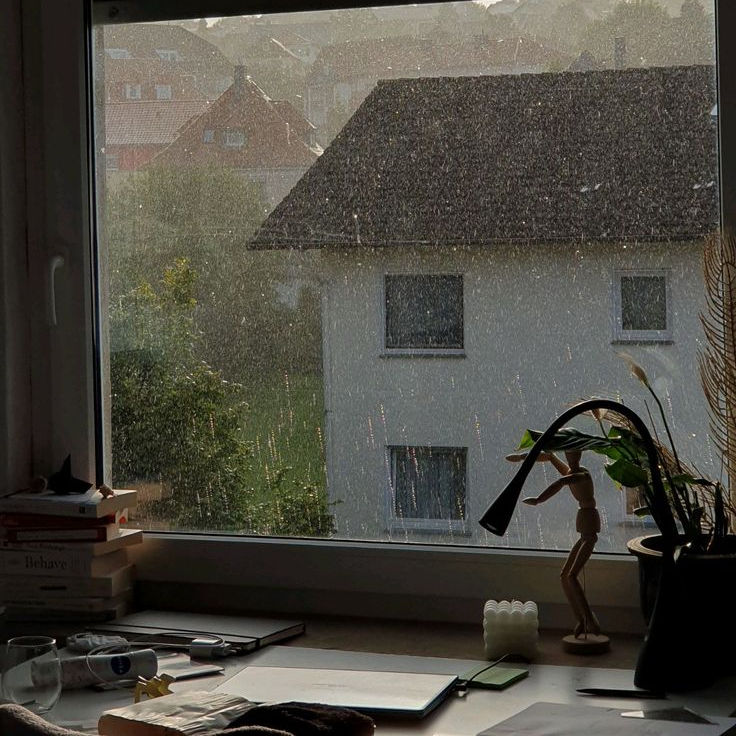Monsoon Letters
- ANAND GOPAL MONDHE

- Aug 5, 2025
- 3 min read
A story with damp pages and unsent endings…..

Pune. July. Rainfall.
The letter wasn’t addressed to her. It was addressed simply:
To: Anandi, Koregaon Park, Pune
Her father found it in the letterbox, slightly wet from the drizzle, the ink on the edges softly bleeding. He handed it to her over his morning tea, his brows raised in concern but his voice gentle.
“Do you know anyone named Anand?” he asked.
Anandi shook her head. Her hair, still damp from her walk in the corridor, clung to her cheek. She took the letter quietly, without opening it, as if she feared it might crack open something inside her.
She read it only once. And even that felt like trespassing.
Dear Anandi,
I don’t know if you remember me — but once, you sat in the front row of my creative writing class, scribbling in your notebook like the world would disappear if you didn’t catch it in time.
You were my first friend. My most curious one. You brought rain into every sentence. I still have that page you once wrote about an empty swing and a lonely dog. It made the whole class go quiet.
It’s been years. But memory doesn’t wear a watch.
So here I am, writing to you again. Because someone told me you forgot how to write.
And I wanted to remind you — your words are still inside you. Hiding. Waiting. Like seeds in soil.
— Anand
The second letter came two days later. She hadn’t replied, of course. She didn’t know what to say to someone she didn’t fully remember.
But something about his handwriting unnerved her — not in fear, but in familiarity. It leaned to the left. Like it was reaching back in time.
Anandi,
You once told me that the monsoon made you feel like a memory with feet. That was your phrase. “A memory with feet.”
You were twelve when you said it.
You sat in the corner room of our little creative school, drawing clouds instead of taking notes. I didn’t stop you.
Sometimes, teachers pretend not to see what’s wrong with a child, not because they’re blind — but because they hope the child will draw it out herself.
I never saw you again after that year. Until last month.
I passed you near the tea stall on Lane 7. You looked straight at me. But your eyes passed through me like I was air.
So I started writing.
She placed the letter under her pillow. She told no one.
At night, she stared at the ceiling fan and wondered: What does a person do when someone remembers a version of them they’ve lost? Is it a gift? Or cruelty?
Her father didn’t ask about the letters anymore. He simply looked at her longer than usual, like he was waiting for a question she couldn’t form.
One day, when the rain hadn’t stopped for hours, she sat with her diary — the one she had stopped using after college. The pages were yellow, brittle. The last entry ended mid-sentence:
“Today, he said my words…”
She didn’t remember who “he” was. But she knew the silence afterward wasn’t just forgetfulness. It was a wound that healed without closing.
The third letter came late. Slipped under the door.
No envelope this time. Just a folded page. Simple. Quiet.
I won’t write again unless you want me to.
There’s a room in our old school — the one with the blue window and the leaky ceiling. I left something for you there.
If you still remember how to find it.
She stared at those lines for a long time.
Then folded the page in half. Then in half again.
Then tucked it behind the mirror.
She didn’t go to school. Not that day. Not the next. Maybe never.
But sometimes, when it rained a certain way — when the water gathered in circles on the tiles, when the wind carried the smell of wet chalk and paper — her fingers itched for a pen.
And on one of those nights, she wrote only five words in her diary:
“I was someone once, Anand.”
Then closed the book.
And let the rain write the rest……
-Anand Gopal Mondhe






Comments